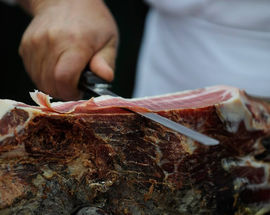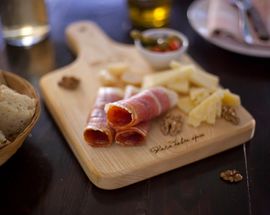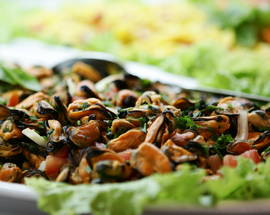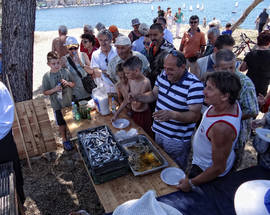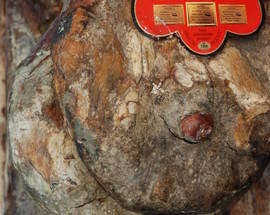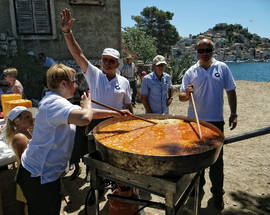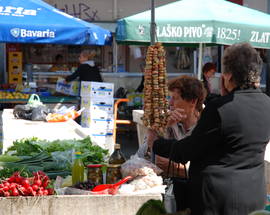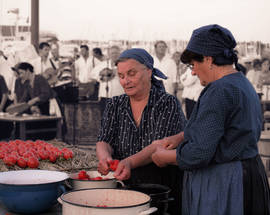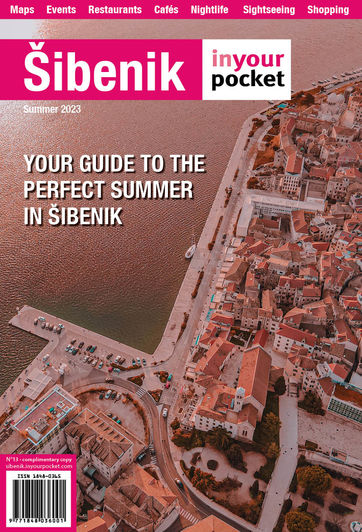In a country renowned for its diversity of culinary culture, the Šibenik region offers a wealth of gastronomic attractions. As well as the best of Adriatic cuisine, there is a profusion of distinctive local delicacies too.
Jump to:
Become a wine connoisseur
Šibenik - Wine recommendationsWho better but a qualified sommelier to give you tip top tips when it comes to wine.
Piližota Babić, Pirovac
A great Babić wine from the Skradin area; the nose is empowered by a seductive cherry, pleasant yet distinctive scent. This is a very mature wine with specific earthy notes. Piližota Babić is definitely recommended, not pretentious, and will not let you down. A wine that seeks another glass!
Bibich Riserva R5 Skradin
A great blend of Chardonnay, debit, maraština, pošip and Pinot Gris. The wine carries its weight and is extremely complex on the nose. It’s allowed to mature on its own yeasts and is cared for in wood. Thanks to this, it gets fine scents of butter, wood, vanilla... A wide glass is best used and is not too low in aroma. This is the kind of wine that you will enjoy with every sip you take.
Bibich Debit Skradin
A great choice for the summer heat; light and full of fruity aromas due to a wide range of quince, sweet apples and herbs. This wine is extremely easy to drink and best expresses the originality of the Skradin area and the wines of its master winemakers. Best served with light white meat dishes and summer salads.
Local Dishes
Fish and shellfishThe waters of the Adriatic are packed with all manner of fish. Fine white fish such as John Dory (kovač), Sea Bass (brancin) or Sea Bream (orada) is usually grilled and served whole (complete with head, tail, skin and bones) – using knives, forks, fingers and teeth to prize away all of the white meat is an essential part of the experience. Fish on restaurant menus is usually priced by the kilogramme – a fish that weighs about 300g-400g is usually sufficient for one person. Many restaurants do however serve individually-priced fish fillets, aware that foreign visitors often find the whole fish-ordering process a bit confusing. The standard accompaniment for fish is mangold (blitva), a green vegetable full of healthy minerals.
Cheaper varieties of fish such as anchovies (srdele or inćuni) are often marinated in oil and serve as excellent snacks or as an accompaniment to a round of drinks.
Squid (lignje) is one of the most popular items on local restaurant menus, served grilled or fried in breadcrumbs.
The Šibenik-Skradin area in particular is famous for its shellfish, and if you are crossing the bridge over the river Krka you will see bobbing floats on the surface of the water marking the oyster beds. Due to the Krka’s clear waters the local mullet (cipalj) has a more delicate taste than elsewhere in the Adriatic and is a common feature of restaurant menus as a result. Moving only slightly upstream, the Krka is also famous for its freshwater trout. Another real delicacy of the Skradin-Krka area is the eel (jegulja, known locally as bižot), which is lighter in texture and taste than the more fatty eels found in the Neretva delta further south.
Roast meats
The maquis-covered hinterland of central Dalmatia provides ideal grazing land for sheep, which can be seen nibbling away on grasses and herbs on the plateau between Šibenik and Knin. Roast lamb on a spit is a popular local dish, and roadside restaurants on the main out-of-town routes frequently entice travellers to pull over by roasting a whole animal in the yard outside. Roast lamb is served by weight with on-the-bone cuts frequently included in each portion – so don’t be too shy to use your hands. Lamb is usually served with several shoots of spring onion.
The other traditional way of preparing local lamb and veal is under a bell-shaped metal lid known as a peka. The method requires a big open hearth, with a log fire to generate the heat. Meat and potatoes are placed in a fire-side pot and covered with the peka lid, which is then covered in hot ashes. The ashes are periodically renewed as the first lot start to cool. The whole process takes about two hours, and results in a wonderfully tender and succulent meal.
Skradin specialities
Veal is also a basic ingredient in Skradinski rižot (Skradin risotto), with the meat cooked slowly for twelve hours (or two days according to some purists) and the rice being added only at the end. Traditionally this is a ritual dish, cooked by the men of the town on the eve of a major feast day. Nowadays you will find it on restaurant menus in Skradin – although you should stick to the best Skradin restaurants if you want to eat a version of Skradinski rižot that has been authentically slow-cooked.
Skradin is also famous for the Skradinska torta, a cake that looks like a traditional sponge cake but has a totally different kind of succulence, largely due to the fact that it is made without any flour - the cake’s texture comes instead from the ground almonds and walnuts that form its prime ingredients. Flavoured with orange peel, honey and rose-petal brandy, it’s a mouth-wateringly delicious culinary discovery for those who haven’t had the good fortune to visit Skradin before. You’ll find it on the dessert menus of most of the town’s restaurants.
Sheep’s-milk cheese
Typical of the Drniš area is sir iz mišine, a sheep’s-milk cheese that is matured while hanging in a tube of sheeps’ gut. The smooth-textured cheese has a distinctive aroma and taste, and should definitely be sampled if you see it advertised on the menus of local restaurants.
Olive oil
The whole of Šibenik county is covered in olive plantations. Olive groves that were allowed to run wild in the latter half of the 20th century have been returned to cultivation, and new saplings can be seen sprouting from stony slopes all around the region. Murter is a major centre of olive oil production, although most production is on a small family-farm level and it is difficult to find locally-bottled oil in shops. Many of the locals sell their oil on souvenir stalls in the centre of Murter town in the summer months.
The Zlatna Ribica restaurant in Brodarica produces oil which is hot-pressed rather than cold-pressed (so it doesn’t qualify for the ‘extra virgin’ label) but it does have a smoother taste and texture as a result, and is very good for general kitchen use. It is sold at their own oil press (uljara) on the island of Krapanj.
Wine and spirits
Šibenik county is a major wine producing region, with vineyards spread out across the hills all along the coast. The most common local wine is the outstanding red Babić, although imported vine strains such as Merlot and Cabernet Sauvignon also flourish here. The best Babić comes from Primošten, although good-quality Babić is also cultivated along the whole of Šibenik county’s coast. Biggest local winery is the Šibenik-based cooperative Vinoplod, which produces top-quality Babić alongside mid-price wines like Plavina (red) and Debit (white), and inexpensive table wines.
Based near Skradin, the Bibich winery produces excellent mid-price autochthonous wines such as red Plavina, dry white Debit, as well as innovative barrel-aged blended wines, and international strains such as the quality red Sangreal Shiraz.
Spirits specific to the Skradin area include rakija od ruža (rose-petal rakija) and liker od žižula (liqueur flavoured with berries from the jujube tree).


